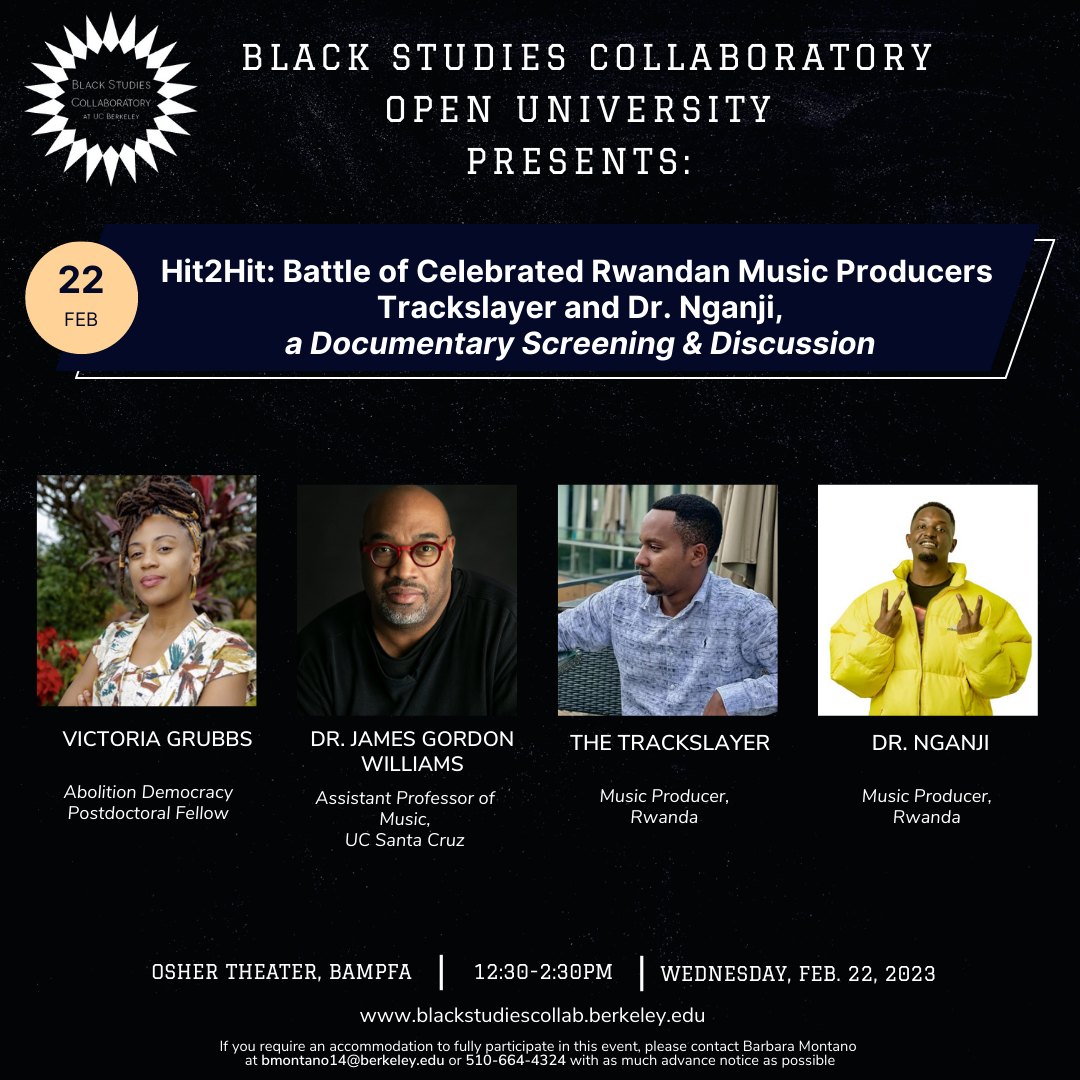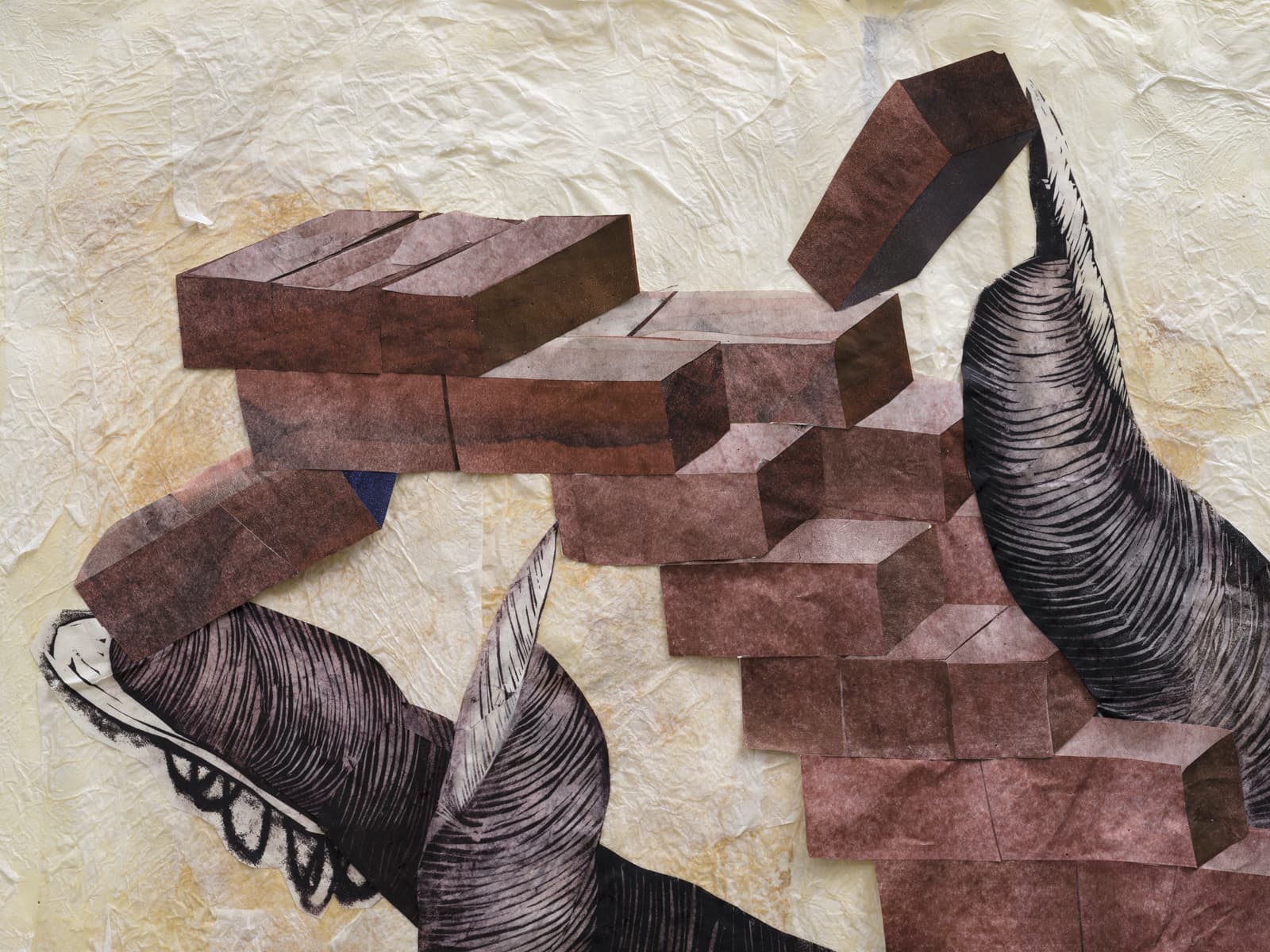Wednesday, February 22, 2023
12:30 – 2:30 pm, PST
Osher Theater, Berkeley Art Museum and Pacific Film Archive, UC Berkeley (2155 Center Street, Berkeley, CA 94720)
Join BSC Abolition Democracy Postdoctoral Fellow Dr. Victoria Grubbs for a documentary screening of Hit2Hit: Battle of Celebrated Rwandan Music Producers Trackslayer and Dr. Nganji and conversation with The Trackslayer and Dr. Nganji, two of Rwanda’s top music producers, and Dr. James Gordon Williams, Assistant Professor Music at UC Santa Cruz. The discussion will aim to spark a broader dialogue about the function of popular music in a post-genocide context.
Panelists
Victoria Grubbs, Abolition Democracy Postdoctoral Fellow, Black Studies Collaboratory, Department of African American Studies, UC Berkeley
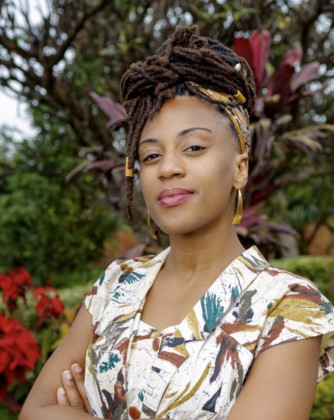
Victoria Netanus Grubbs is a black feminist abolitionist educator committed to developing radical leadership in underserved communities in the U.S. and abroad. She completed her Ph.D. in the Department of Media, Culture, and Communication at New York University in May 2021.
Her current book project, Kumva Meze Neza: Sounding Blackness in Rwanda, examines how popular Rwandan music works in the aftermath of genocide to produce a collective social body. Drawing on six years of participant observation amongst Rwandan music industry professionals and their audiences, her work demonstrates how shared investments in the sensory experience of blackness produce formations of togetherness that defy traditional organizing categories. Victoria is also the founder of the recording studio and label GMC Records Rwanda.
Dr. James Gordon Williams, Assistant Professor of Music, UC Santa Cruz
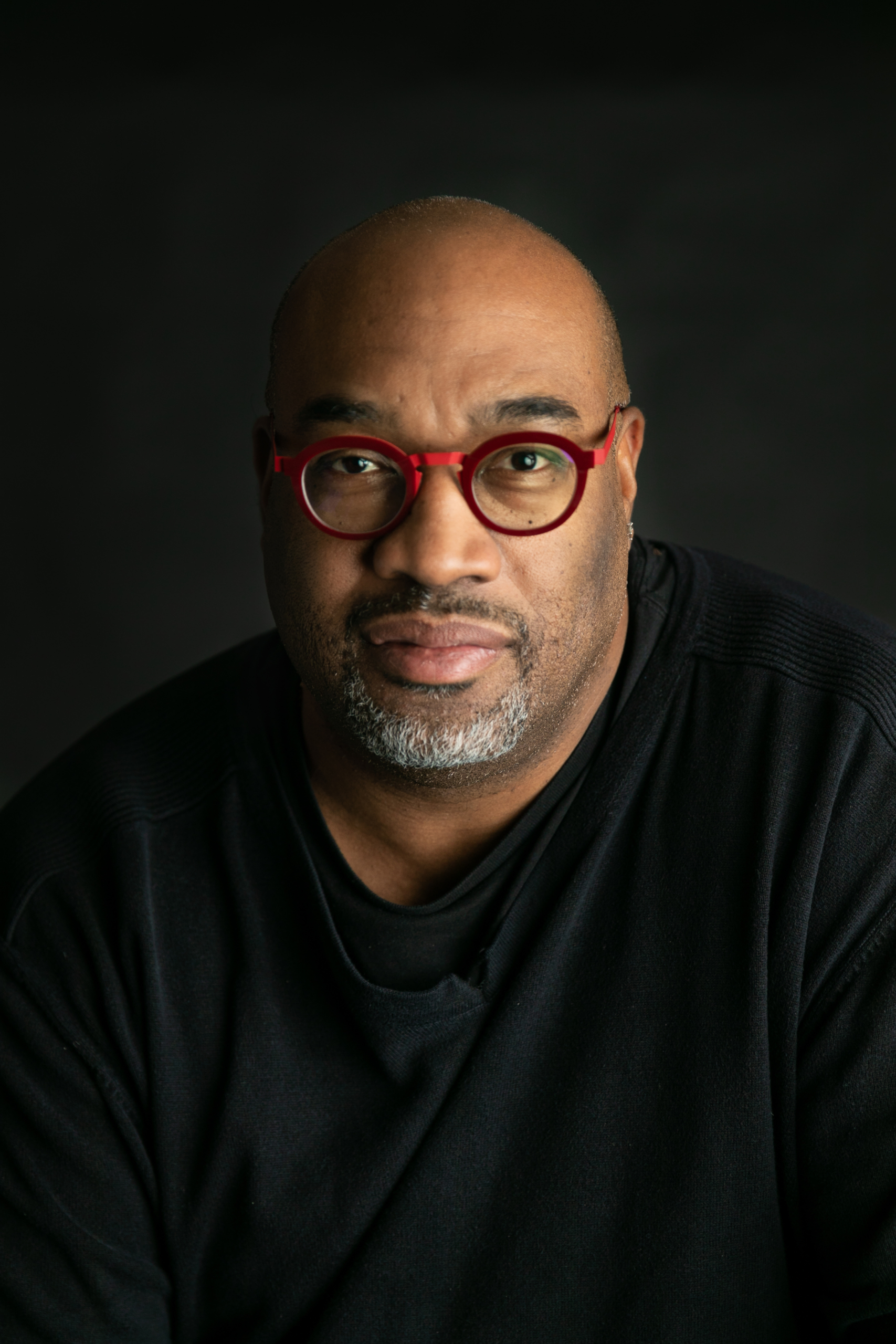
James Gordon Williams is a composer, pianist, improviser, and cultural theorist. He has worked with artists Crystal Z. Campbell, Cauleen Smith, Suné Woods, MacArthur Fellow Fred Moten, Pulitzer Prize-winning composer Anthony Davis, Miles Griffith, Gregory Porter, MacArthur Fellow George E. Lewis, Mark Dresser, Greg Osby, and Charli Persips’ Supersound big band and many other luminaires. He has performed in such storied places as Birdland, Village Vanguard, and many music festivals in the United States, Malta, Switzerland, France, and Italy. Recent composition projects include Syracuse Stage commissioned music for playwright Kyle Bass’s salt/city/blues and an original commissioned work for Compagnia de’ Colombari. He is the author of Crossing Bar Lines: The Politics and Practices of Black Musical Space (2021) which has been described as: “An elegant and theoretically rich book steeped in jazz performance praxis, contemporary musicological research, and Black feminist geography, Crossing Bar Lines highlights how Black lived experience, music-making, and politicized Black place-building have long been entwined in the broader U.S. cultural field . . . Williams’s book will undoubtedly serve as a rich guide for listeners, musicians, scholars, and critics seeking the space in which to live, to make, and to breathe.” Dr. Williams’s peer-reviewed articles have appeared in Ethnomusicology Review, Jazz & Culture, Jazz Research Journal, Journal of African American Studies, Liquid Blackness, and Music in American Life: An Encyclopedia of the Songs, Styles, Stars, and Stories That Shaped Our Culture. He is an assistant professor of Composition in African American/Global-African Traditions in the Department of Music at the University of California, Santa Cruz. Prior to this position, he taught music in the Department of African American Studies at Syracuse University. He holds a Ph.D. in music from the University of California, San Diego. He is a member of the Society of American Music and the American Musicological Society.
The Trackslayer, Music Producer, Rwanda
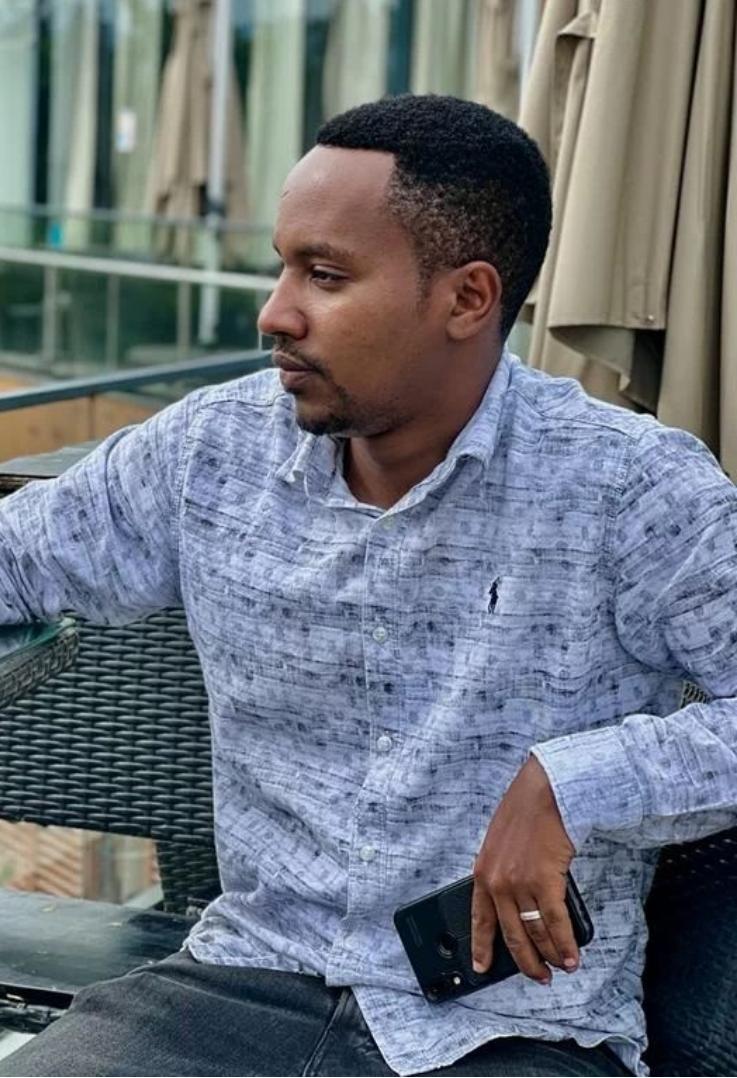
Follow The Trackslayer on Instagram @the_trackslayer_music
Dr. Nganji, Music Producer, Rwanda

Dr. Nganji is a Rwandan musician, record producer, executive, and entrepreneur. Dr. Nganji’s first breakthrough production work was in 2017 on a single called ‘Zombi’, a Kinyatrap song that featured Bushali, Maktain, Crazy K, Masotela, Mazimpaka Prime & White Monkey. After further work on Green Ferry Music’s Mixtapes (2017) and Bushali’s debut studio album ‘Nyiramubande’ (2018), Dr. Nganji became a prominent producer for Green Ferry Music label’s artists. A record producer, he influenced and sparked the “KINYATRAP” movement in the Rwandan music scene, a fusion of Rwandan poetry and trap melodies never heard before that birthed an entire style and sound in Rwanda. As an artist and producer, Dr. Nganji initially released two projects (EP and album) with fellow artists from Green Ferry Music records and emerging artists from Rwanda. He started with his debut EP ‘Doze’ in 2018, followed by his debut studio double album ‘After Doze’ in 2019. Aside from the aforementioned artists, Dr. Nganji’s production credits from 2017 forward include work with Mike Kayihura, Bulldogg, The Ben, K1vumbi K1ng, Bruce Melodie, Magnom, Daara J Family, among others. As an entrepreneur, he has made several entertainment businesses with his company Green Ferry Music, including organizing events and managing artists. In 2020, Channel 24 Entertainment Now stated that “Dr. Nganji’s Green Ferry Music Records has become one of the most influential music entities in Rwanda.” Follow Dr. Nganji on Instagram @greenferrymusic.
Brenda Umutoniwase, Graduate Student, Folklore Studies MA Program, UC Berkeley
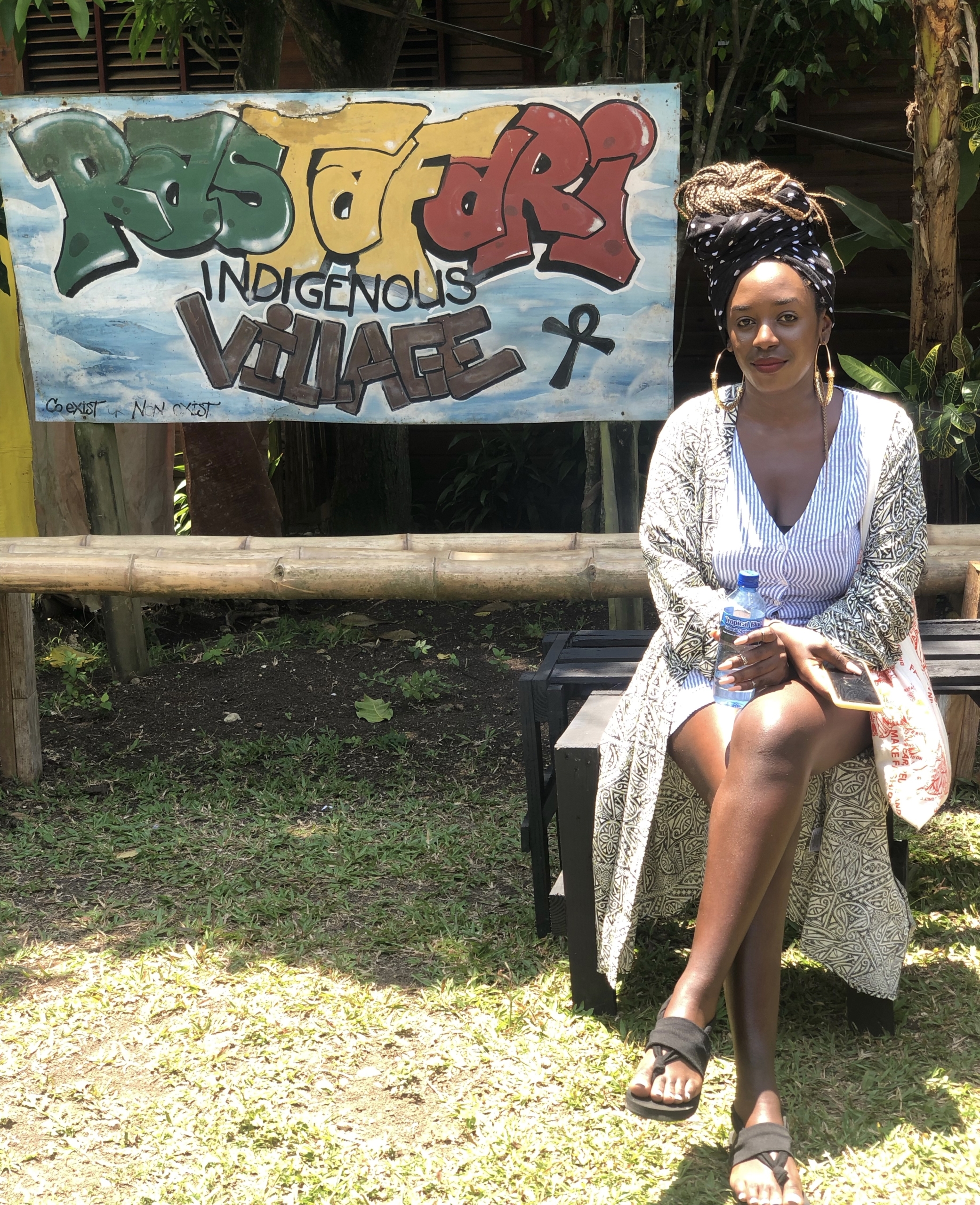
Brenda Umutoniwase is a second-year Graduate student in the Folklore Studies MA Program at UC Berkeley. Broadly, she is interested in thinking about formulations of Blackness beyond the Black Atlantic epistemologies, particularly temporal/geographic spaces in contemporary Africa that have no direct connection to the events of the middle passage. With her current focus on Rwanda, Brenda is studying how our attention to sound as a historical modality and the sonic textures of cultural production in Rwanda may challenge our notion of the archive and memory, offering us alternative means through which to think about Blackness/Black life and imagine new [Black] worlds.
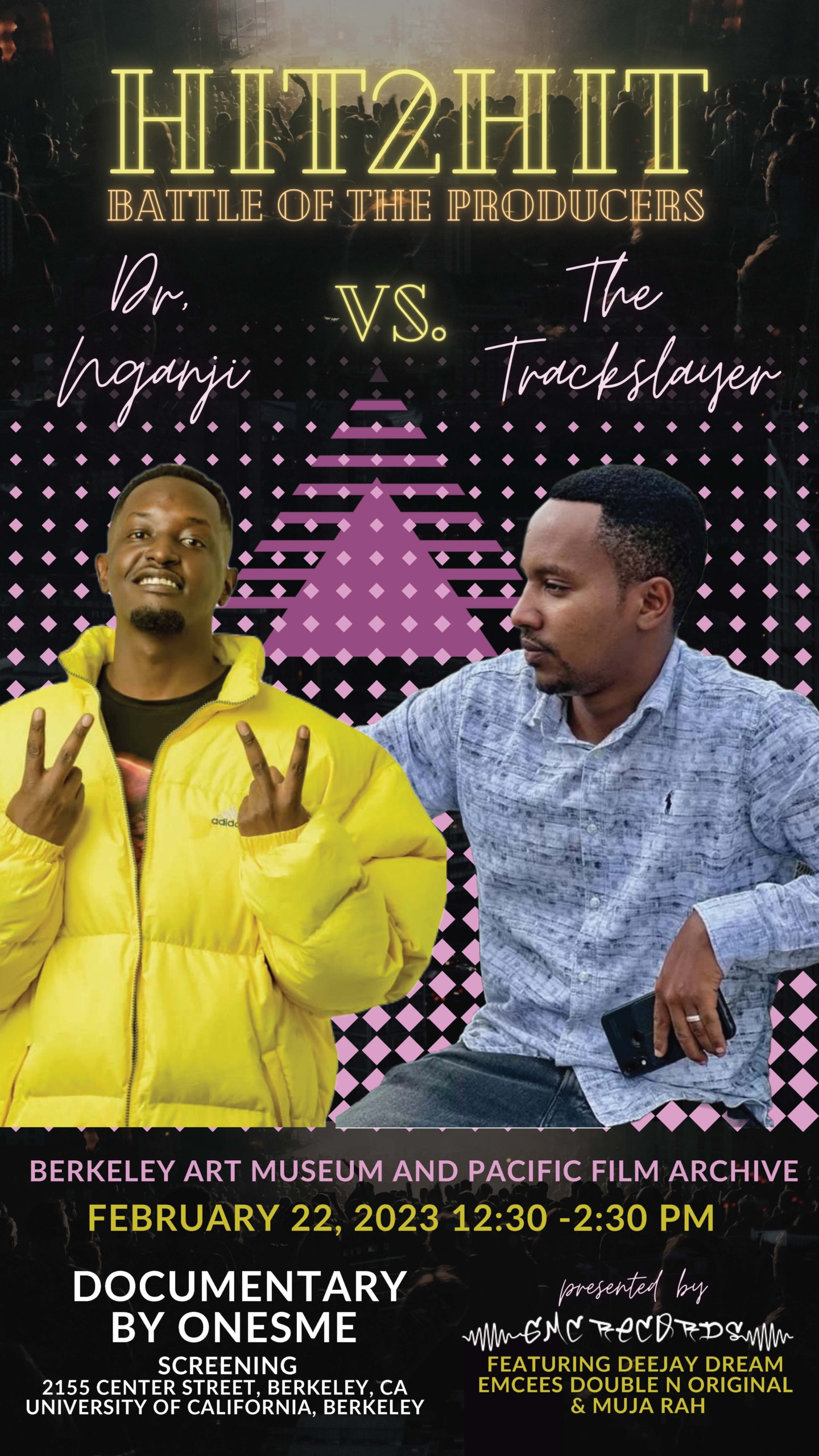
Accessibility
This event is free and open to the public. The venue is wheelchair accessible. ASL interpretation will be provided. If you need accommodations to fully participate, please contact Barbara Montano at bmontano14@berkeley.edu or 510-664-4324 with as much advance notice as possible. Please refrain from wearing any scented products, including essential oils.
